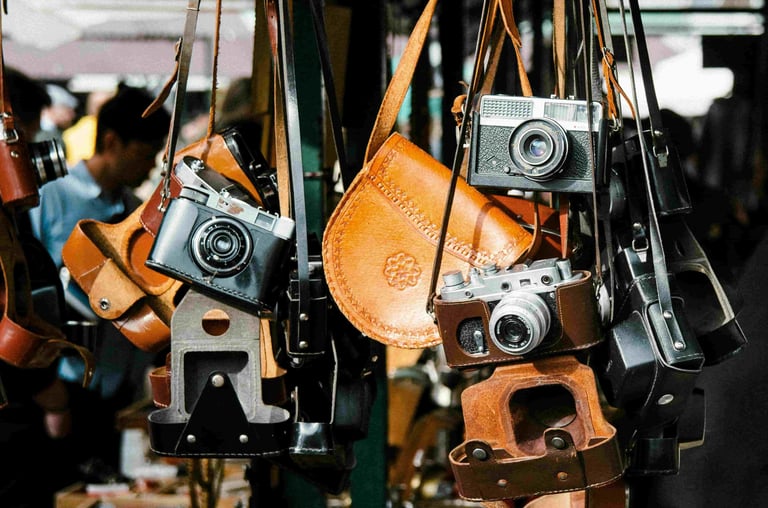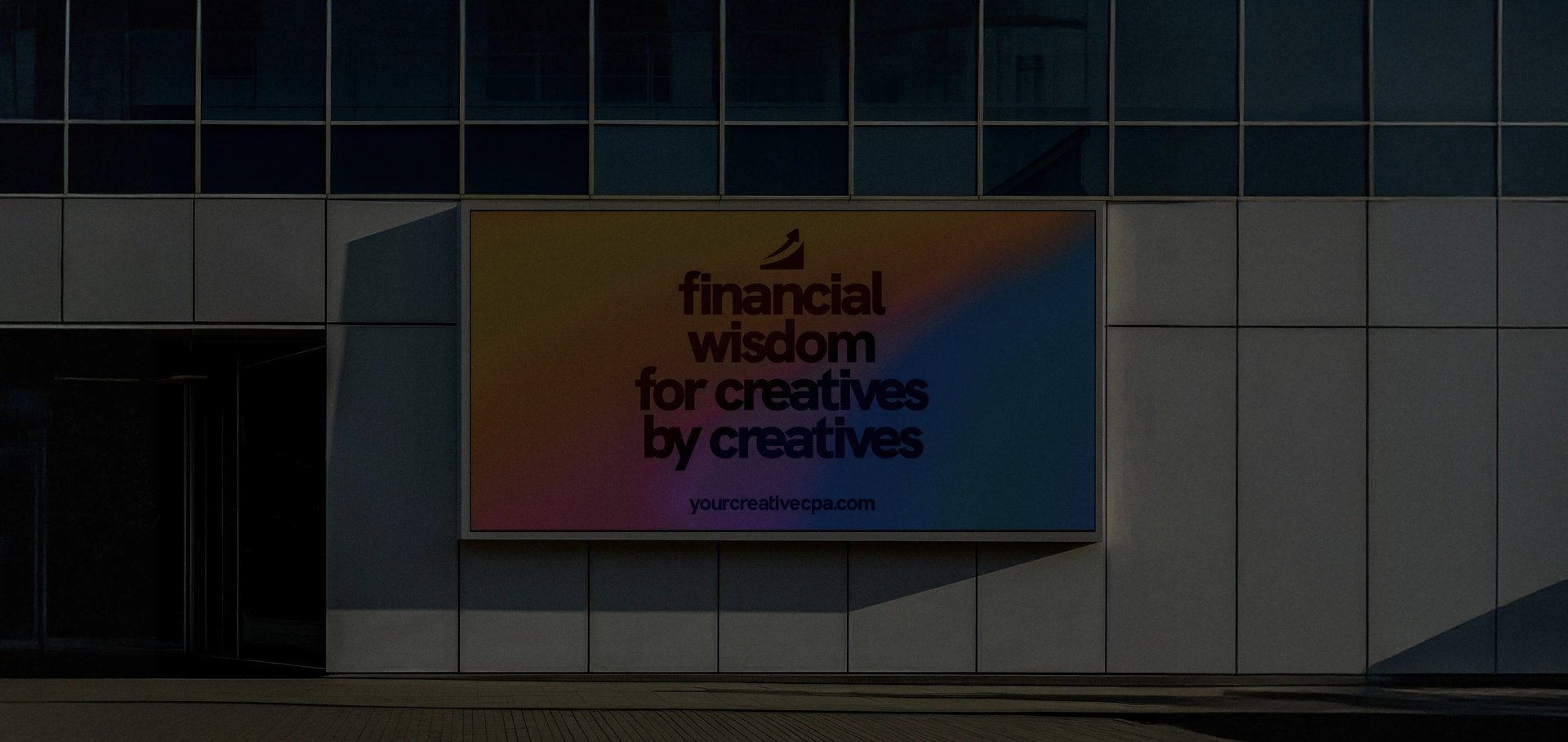
Easily Understand Your Finances With The Financial Health Check Template Today
2025 Guide to Writing Off Camera Equipment On Your Taxes
Unleash your tax savings potential! This guide explores how photographers can deduct camera gear, software, travel & more. Optimize your deductions & keep more money flowing.
ACCOUNTINGTAX
David Kindness, CPA
5/1/2025



2025 Guide to Writing Off Camera Equipment On Your Taxes
Updated on April 30, 2025
Written by David Kindness, CPA
Why you can trust Your Creative CPA
Our content is written, edited, or both by industry experts who are creative entrepreneurs just like you. Learn more.
For aspiring and professional photographers alike, camera equipment is a significant investment. You may be stressing over whether or not a new camera body, lens, filter, or other piece of gear is worth the expense.
The good news is that the cost of those essential cameras, lenses, lights, and other photography tools can potentially be tax-deductible if you use the gear for business purposes. But there are some key details to understand in order to maximize your tax deductions and lower your tax bill.
Fast Facts About Deducting Camera Gear
Camera gear can be tax-deductible as long as it's used in your business - but, like all tax topics, there are rules, so read on below.
Some purchases can be fully deducted right away (in the year you purchase the equipment), and others must be depreciated, which means you deduct the expense slowly, over time.
More than just camera gear can be deductible - anything you use for your business can be. This can include lighting, tripods, backpacks, filters, flashes, software, and more.
What Types of Gear are Tax-Deductible?
Before we get too into the weeds, let's give a brief overview of what types of gear are tax-deductible. The Internal Revenue Service (IRS) allows photographers and videographers to deduct various types of gear, but the stipulation is that the gear must be used in a business. That means that you have to use the gear either to make money or with the intention of making money at some point.
Now let's dive into some examples of gear that photographers and videographers can generally deduct...
Camera bodies, lenses, and filters
Tripods, monopods, and C-stands
Gimbals, stabilizers, and Steadicams
Lighting, flashes, and flash modifiers (softboxes, umbrellas, diffusers)
Camera accessories: batteries, memory cards, cleaning brushes and wipes, straps, etc.
Editing software: Lightroom, Photoshop, Premiere Pro, After Effects, Davinci Resolve, etc.
Data storage: hard drives and SSDs
Web subscriptions: data storage, backups, image and video sharing platforms, audio platforms, etc.
Understanding Immediate Deductions vs. Capital Expenses
Whether or not you can deduct camera gear gets a little tricky because, depending on the cost of the equipment, it can either be deducted immediately, or it has to be "capitalized", which just means you'll have to depreciate it over several years (taking a smaller expense each year).
Generally, the IRS considers equipment that costs more than $2,500 to be a "capital asset", which means you'll probably have to depreciate it over time. That means that your $1,600 lens can be fully deducted in the current year, but your $3,900 camera body might not qualify.
There is, however, a way around this rule, and it's called the Section 179 Depreciation Deduction (catchy name, I know). We'll discuss that more below...
What is The Section 179 Deduction?
In general, deducting the entire cost of a purchase right away is great because it lowers your tax bill and saves you money. But what do you do if the expense is over the $2,500 capitalization threshold and must be depreciated over time? That's where the Section 179 Deduction comes in. Section 179 allows businesses to deduct the full cost of an asset even if it's over the $2,500 threshold.
To qualify for the full deduction under Section 179, the total cost of equipment you purchase in a single tax year must be below a certain threshold set by the IRS (this amount is adjusted annually). For 2025, the maximum deduction under Section 179 is $1,250,000, with a phase-out limitation starting at $3,130,00 in property placed into service during the year. That means that if your depreciable purchase is equal to or less than $1,250,000, then you can still deduct it! If your camera gear is above that amount, shoot me an email and let me know what you're using it for!

Camera gear can be tax-deductible as long as it's ordinary and necessary for your your business.

What if I Use The Gear for Both Business and Personal Use?
The occasional personal photo with your professional camera likely won't raise any red flags. However, if you regularly use your equipment for personal projects or hobbies, the situation could get a little trickier. The IRS requires that expenses be "ordinary and necessary" for your business in order to be deductible.
For camera equipment, you can claim a business-use percentage deduction based on how much you use it for photography jobs compared to personal use. For example, if you use the gear 50% for business and 50% for personal use, then 50% of the cost would be deductible. Using this method might involve detailed record-keeping to track usage, however. It's best not to tempt the IRS, so we recommend deducting expenses appropriately!
Tracking and Documenting Expenses
Like with anything accounting and tax-related, tracking and documenting your equipment expenses is important. It's crucial to keep detailed records of all your photography-related expenses, including receipts, invoices, and proof of purchase for your camera equipment. This documentation is essential for claiming either the deduction, depreciation, or the Section 179 deduction on your tax return. If the IRS ever comes knocking, you'll be glad you kept your receipts.
When to Consult a Tax Professional
Tax laws can be complex, and the best course of action for maximizing your deductions depends on your specific business situation, income, expenses, deductions, and tax credits. Consider consulting with a tax professional experienced with self-employed creatives and small businesses. They can guide you through the intricacies of tax deductions for photographers and videographers and ensure you're taking advantage of all the benefits available to you.
Conclusion
As a photographer, videographer, and creative business owner, you know the importance of investing in quality equipment to capture stunning imagery. But that initial investment can feel overwhelming, especially when tax season rolls around.
But remember, you're not alone in navigating the world of investments, business expenses, and tax deductions. The information in this article is meant to empower you on your creative journey, allowing you to feel confident that you're saving every dollar you can on taxes while making smart investments for your creative business.
Frequently Asked Questions (FAQs)
Can I deduct the entire cost of my new camera right away?
Maybe! Under Section 179 of the IRS tax code, you can potentially deduct the full cost of qualifying business equipment purchased and used in the current tax year, as long as the total cost stays below a certain limit set annually by the IRS ($1,220,000 for 2024 and $1,250,000 for 2025). This can be a significant benefit, especially for new photographers building their gear collection.
What photography equipment can I deduct besides cameras?
The good news is that many essentials beyond your camera body qualify! Lenses, tripods, flashguns, lighting equipment, and even light modifiers can potentially be deducted as capital expenses.
Should I consult a tax professional about my photography deductions?
Consulting a tax professional about business-related tax deductions is generally not necessary unless you're confused about the deduction or if the amount is really high and you want to make sure you're handling it perfectly.
Tax laws can be complex, and the best way to maximize your deductions depends on your unique business situation and income. A tax professional with experience in self-employed individuals or small businesses can give you personalized advice to ensure you're taking advantage of all the tax benefits available to photographers.
I use my personal computer for both business and personal use. Can I deduct part of the cost?
Yes! The IRS allows for deductions based on business usage percentage. Keep detailed records of how much you use your computer for photography tasks. For example, if you use it 50% for business and 50% for personal use, then 50% of the cost would be deductible. If you're still unsure, it may be worth consulting with a tax professional to determine the best approach for claiming a partial deduction.
I haven't kept great records of my photography expenses. Can I still deduct them?
The IRS does allow some leeway for reconstructing records, but it's best practice to maintain good documentation throughout the year. Consider gathering bank statements, credit card receipts, and any invoices you have for photography-related purchases. Consult a tax professional for guidance on reconstructing missing records.
Can I deduct the cost of photography courses or workshops?
Yes, educational expenses directly related to improving your photography skills can be deductible. Keep receipts for tuition, travel, and other related costs associated with the course, workshop, or conference.
Disclaimer: the information provided in this article is for educational purposes only and does not constitute tax, accounting, investing, legal, or financial advice. The information in this article does not take into account your unique financial or business situation or goals, and YCCPA cannot be responsible for reader's financial decision-making. YCCPA's goal is to educate and support you on your creative business journey.
Written by David Kindness, CPA
David is a CPA (Certified Public Accountant) and professional photographer, videographer, and designer based in San Diego, California. Learn more.
Supported by Ads
Your Creative CPA is supported by the ads you may see in our articles and guides. These ads help us serve creatives like you.







financial wisdom for creatives, by creatives

Created by David Kindness
© 2025 Your Creative CPA | Terms
type1wild.com partner
Exclusive guides and tools for creatives, right to your inbox.









